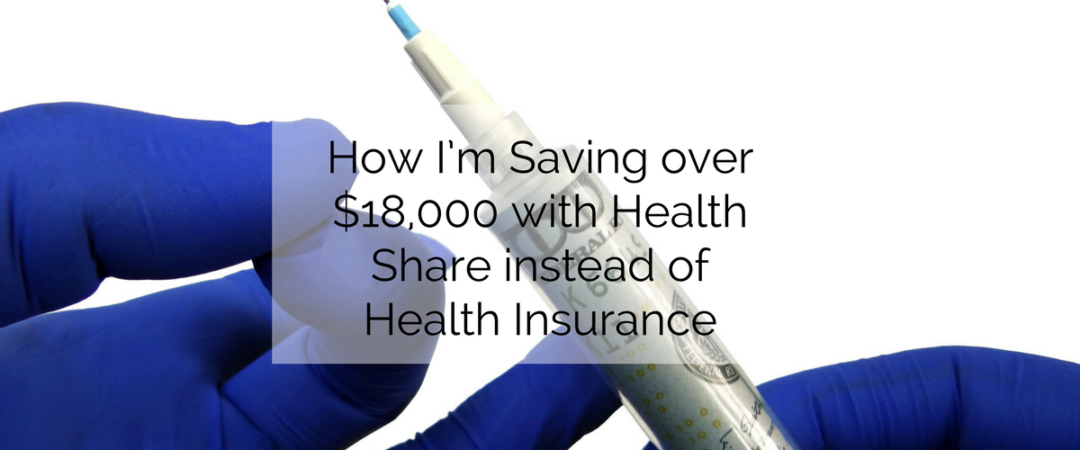Are you fed up with the cost of health insurance? Have you considered a health insurance alternative?
During 2017, our family of four paid what I consider to be an astronomical amount in health insurance premiums and out-of-pocket expenses. So much so that it forced us to look at and research alternatives. Now don’t get me wrong. If you’re health insurance costs are affordable – keep it and don’t read further. But if you’re fed up with the amount of money that goes out the door like I was, read on.
The Numbers
$13,200 for Health Insurance Premiums in 2017
Premiums were just north of $1,100 per month, so for easy math I’ll use that number. To simply have health insurance meant that $13,200 was automatically gone. This didn’t count any out-of-pocket expense such as co-pay, deductible, or medication.
$12,000 for Out-of-Pocket Health Insurance Costs in 2017
Out of pocket max on our plan was $12,000. This may seem like a lot and that one would never reach that amount, but try having kids who are normal active kids that accidental things and injury happen to. We had an emergency appendectomy, a sports injury, and all the other regular things that can happen. We had illnesses that needed medication, we visited the chiropractor, we saw orthopedic specialists, and the list goes on. Needless to say, we paid the full $12,000.
$25,200 spent for Health Insurance in 2017
This is the total amount we spent in 2017 for our health care needs. I wasn’t okay with this. Think of even saving $5,000 or $10,000 and what you could do with that money?!? Right? So in June 2017, I started to research different options and found an alternative model that seemed like a good fit – health share ministry.
What is a health share ministry?
A health share ministry is simply a group of like-minded Christians that formed an organization with a mission to help one another with medical costs. Members pay a monthly share amount similar to monthly insurance premiums and choose a level of coverage that is right for their particular needs. When a medical event occurs, members submit their bills and funds are shared by other members to cover costs. Although it is not health insurance, most health share ministries do qualify for an exemption from the individual mandate of the Affordable Care Act. Now, this won’t be a great fit for everyone as there are certain requirements, but it’s definitely worth looking into. According to healthcaresharing.org, nearly one million people are enrolled in health share ministries across the US.
The Options
I researched four primary health share ministries that were built around similar models. Pricing was last updated December 2018.
1. Liberty Health Share
2. Medi-Share
3. Christian Health Care Ministry
4. Samaritan
| Liberty Health Share | Medi-Share | Christian Health Care Ministry | Samaritan | |
| Monthly Cost | $249 – $579 | $214 – $861 | $45 – $450 | $100 – $894 |
| Electronic Bill Processing | ✔ | ✔ | No | No |
| ACA Exempt | ✔ | ✔ | ✔ | ✔ |
| Monthly Sharing Automation | ✔ | ✔ | ✔ | No |
| Max Share per Event | $125K-$1million | None | $125K- $1million | $236K – None |
| All States | Not Pennsylvania | ✔ | ✔ | ✔ |
Two of the health share ministries were eliminated right away since they did not offer electronic bill processing. Sorry, I value my time and need my sanity, so the thought of messing around with paper billing nearly made me ill. So, I’ll focus on the two that I researched more heavily and ultimately had to make a decision between.
3. Christian Health Care Ministry – no electronic bill processing
4. Samaritan – no electronic bill processing
The last two honestly came down to price since all else was pretty similar except for the max amount able to be shared per incident. Medi-Share is more geared toward protecting against catastrophic events. They do not have a maximum share cap. Liberty Health Share has three different programs with varying max share amounts per incident. Below are the options and prices for a family, which is three people and above, where the adult members are between the ages of 30 and 65.
Liberty Health Share
Liberty Health Share has three different programs offering the same unshared amount (similar to health insurance deductible), but with differing max share amounts per event.
| PROGRAM | ANNUAL UNSHARED AMOUNT | MONTHLY FAMILY AMOUNT | TOTAL COST PER YEAR | MAX SHARE AMOUNT PER EVENT |
| Liberty Share | $2,250 | $479 | $7,998 | 70% of bills up to $125K |
| Liberty Plus | $2,250 | $504 | $8,298 | $125K |
| Liberty Complete | $2,250 | $529 | $8,598 | $1 Million |
There is also a $135 first year membership fee and then recurring $75 per year thereafter.
Medi-Share
There is only one program as all max share amounts are unlimited; however, you do have several options in choosing the annual household portion (same as annual unshared amount with Liberty) or very similar to a typical health insurance deductible.
| ANNUAL HOUSEHOLD PORTION | STANDARD MONTHLY SHARE | TOTAL COST PER YEAR |
| $1,750 | $861 | $12,082 |
| $3,000 | $685 | $11,220 |
| $4,250 | $564 | $11,018 |
| $5,500 | $470 | $11,140 |
| $8,000 | $362 | $12,344 |
| $10,500 | $262 | $13,644 |
There is a $50 one-time application fee, a one-time $120 member fee with nothing further recurring, and a $2 fee to set up the sharing account.
As you can see, the price difference is fairly significant. I did a little research and found out that about only 2% of all medical events are over the $1 million mark. In order to opt for cost-savings, I was comfortable with this cap.
So, what did we choose?
We ended up choosing Liberty Complete. It was still nearly $3,000 less than the cheapest Medi-Share plan (now nearly $2,500 less with Dec 2018 pricing) and provided up to $1 million per incident. Although this was the most expensive option from Liberty Health Share, it seems like a conservative first step since we are transitioning from health insurance to health share.
To be honest, I’m a little nervous to see how this goes, but for a cost-savings of over $18,000 I’m ready to give it a try.
Considerations
1. First, do your own, thorough research. Every person and family is different with different needs, so make sure you do your due diligence before dropping your insurance and making the switch. If you have a pre-existing condition or take lots of medications, this may not be a good option for you. Also, if you are of a “healthy” weight with equally healthy indicators you may be able to obtain a discount on monthly share amounts, but on the other hand, if you are overweight and have unhealthy indicators, you may pay an extra monthly share amount and need to enroll in a program to help you meet specific requirements.
2. Second, make sure you agree with the ministry beliefs. Although it may provide a significant cost-savings, you still need to align with the fundamental beliefs. This will ensure that your lifestyle and the expenses shared will have a greater chance of being covered. if you engage in activities such as skydiving, drinking and driving, smoking, or are an adrenaline junky, there are stipulations as to what will and won’t be covered should an accident or health issue arise.
3. Third, dental and vision coverage are not included. If you or your family members would be high users beyond typical checkups, you’ll need to determine what financial impact this may have on you. We never needed vision insurance and the dental insurance that we had never seemed to save us much money, so we felt comfortable with this tradeoff. Saving $18,000 per year is definitely worth paying a few hundred per year out of pocket at the dentist.
4. Fourth, there is no guarantee that your medical costs will be covered or shared. Up to this point, each ministry claims to have been able to cover 100% of members eligible shared bills, so while it may be unlikely, it is still a risk.
5. Fifth, your monthly share payments are not tax deductible since this is not insurance. While health share does qualify for the ACA tax exemption so you will not have to pay a penalty, it cannot be used as a tax deduction.
Final thoughts?
Overall, health share ministries can provide significant cost-savings to those without pre-existing conditions, not using a lot of expensive medications, and those in alignment with Christian beliefs. With the current cost of health insurance, I can only see this option gaining popularity. Just make sure you do your research before making the switch.
Additional Ways to Save Your Money:
- 3 Reasons Why You Absolutely Need to have Every Day Goal Reminders
- Why you must set a Vividly Real Goal so Real you can Taste it
- Make money by shopping at stores you love using Ebates
- Is it possible to get a 4-year college degree debt free?
- Overcome Your Rough Financial Situation in 5 Steps
Questions for you:
1. How much are you paying monthly for health insurance?
2. Or what has your health sharing ministry experience been like so far?





No Comments